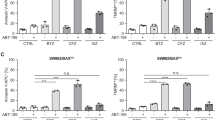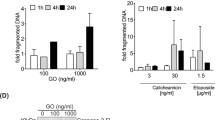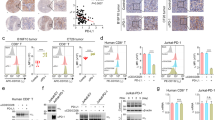Abstract
Combinations with proteasome inhibitors are currently being investigated to improve the therapy of hematological malignancies. We previously found that proteasome inhibition by bortezomib failed to sensitize anti-CD30 antibody (Ab)-based lymphoma cell killing. In this study, we demonstrate in L540 Hodgkin's lymphoma cells that proteasome inhibition not only communicates apoptosis but also more rapidly causes a loss of CD30 antigen from cell membrane and a simultaneous release of soluble CD30, a targeting competitor. This shedding was catalyzed by the tumor necrosis factor (TNF)-α-converting enzyme (TACE, ADAM17) and blocked by the ADAM17-selective inhibitor, Ro32-7315. In parallel with CD30 shedding, bortezomib caused the generation of reactive oxygen species (ROS). As apoptosis and shedding were inhibited by the radical scavenger, N-acetyl-L-cysteine, ROS might have a pivotal function in both effects. In contrast, the pan-caspase inhibitor, zVAD-fmk, blocked bortezomib-induced apoptosis but not CD30 shedding, and Ro32-7315 blocked shedding but allowed apoptosis. This suggests independent terminal signaling pathways that are conflicting in Ab-based immunotherapy. Consequently, shedding inhibition substantially improved the synergistic antitumor efficacy of the human anti-CD30 Ab, MDX-060, and bortezomib. As proteasome inhibition also stimulated loss of TNF receptors, interleukin-6 receptor and syndecan-1 in different leukemia and lymphoma cell lines, we concluded that proteasome inhibition might impede targeted therapy against antigens susceptible to shedding.
This is a preview of subscription content, access via your institution
Access options
Subscribe to this journal
Receive 12 print issues and online access
$259.00 per year
only $21.58 per issue
Buy this article
- Purchase on Springer Link
- Instant access to full article PDF
Prices may be subject to local taxes which are calculated during checkout






Similar content being viewed by others
References
Ansell SM, Horwitz SM, Engert A, Khan KD, Lin T, Strair R et al. Phase I/II study of an anti-CD30 monoclonal antibody (MDX-060) in Hodgkin's lymphoma and anaplastic large-cell lymphoma. J Clin Oncol 2007; 25: 2764–2769.
Bartlett NL, Younes A, Carabasi MH, Forero A, Rosenblatt JD, Leonard JP et al. A phase 1 multidose study of SGN-30 immunotherapy in patients with refractory or recurrent CD30+ hematologic malignancies. Blood 2008; 111: 1848–1854.
Schnell R, Staak O, Borchmann P, Schwartz C, Matthey B, Hansen H et al. A Phase I study with an anti-CD30 ricin A-chain immunotoxin (Ki-4.dgA) in patients with refractory CD30+ Hodgkin's and non-Hodgkin's lymphoma. Clin Cancer Res 2002; 8: 1779–1786.
Hansen HP, Dietrich S, Kisseleva T, Mokros T, Mentlein R, Lange HH et al. CD30 shedding from Karpas 299 lymphoma cells is mediated by TNF-alpha- converting enzyme. J Immunol 2000; 165: 6703–6709.
Saitoh Y, Yamamoto N, Dewan MZ, Sugimoto H, Martinez Bruyn VJ, Iwasaki Y et al. Overexpressed NF-kappaB-inducing kinase contributes to the tumorigenesis of adult T-cell leukemia and Hodgkin Reed-Sternberg cells. Blood 2008; 111: 5118–5129.
Jost PJ, Ruland J . Aberrant NF-kappaB signaling in lymphoma: mechanisms, consequences, and therapeutic implications. Blood 2007; 109: 2700–2707.
Roccaro AM, Vacca A, Ribatti D . Bortezomib in the treatment of cancer. Recent Patents Anticancer Drug Discov 2006; 1: 397–403.
Boll B, Hansen H, Heuck F, Reiners K, Borchmann P, Rothe A et al. The fully human anti-CD30 antibody 5F11 activates NF-{kappa}B and sensitizes lymphoma cells to bortezomib-induced apoptosis. Blood 2005; 106: 1839–1842.
Peiretti F, Canault M, Bernot D, Bonardo B, Deprez-Beauclair P, Juhan-Vague I et al. Proteasome inhibition activates the transport and the ectodomain shedding of TNF-alpha receptors in human endothelial cells. J Cell Sci 2005; 118: 1061–1070.
Levine SJ, Adamik B, Hawari FI, Islam A, Yu ZX, Liao DW et al. Proteasome inhibition induces TNFR1 shedding from human airway epithelial (NCI-H292) cells. Am J Physiol Lung Cell Mol Physiol 2005; 289: L233–L243.
Reddy P, Slack JL, Davis R, Cerretti DP, Kozlosky CJ, Blanton RA et al. Functional analysis of the domain structure of tumor necrosis factor- alpha converting enzyme. J Biol Chem 2000; 275: 14608–14614.
Horn-Lohrens O, Tiemann M, Lange H, Kobarg J, Hafner M, Hansen H et al. Shedding of the soluble form of CD30 from the Hodgkin-analogous cell line L540 is strongly inhibited by a new CD30-specific antibody (Ki-4). Int J Cancer 1995; 60: 539–544.
Beck G, Bottomley G, Bradshaw D, Brewster M, Broadhurst M, Devos R et al. (E)-2(R)-[1(S)-(Hydroxycarbamoyl)-4-phenyl-3-butenyl]-2′-isobutyl-2′-(methanesulfonyl)-4-methylvalerohydrazide (Ro 32-7315), a selective and orally active inhibitor of tumor necrosis factor-alpha convertase. J Pharmacol Exp Ther 2002; 302: 390–396.
von Tresckow B, Kallen KJ, von Strandmann EP, Borchmann P, Lange H, Engert A et al. Depletion of cellular cholesterol and lipid rafts increases shedding of CD30. J Immunol 2004; 172: 4324–4331.
Blum KA, Johnson JL, Niedzwiecki D, Canellos GP, Cheson BD, Bartlett NL . Single agent bortezomib in the treatment of relapsed and refractory Hodgkin lymphoma: cancer and leukemia Group B protocol 50206. Leuk Lymphoma 2007; 48: 1313–1319.
Mendler JH, Kelly J, Voci S, Marquis D, Rich L, Rossi RM et al. Bortezomib and gemcitabine in relapsed or refractory Hodgkin's lymphoma. Ann Oncol 2008; 19: 1759–1764.
Trelle S, Sezer O, Naumann R, Rummel M, Keller U, Engert A et al. Bortezomib in combination with dexamethasone for patients with relapsed Hodgkin's lymphoma: results of a prematurely closed phase II study (NCT00148018). Haematologica 2007; 92: 568–569.
Eichenauer DA, Simhadri VL, EP von Strandmann, Ludwig A, Matthews V, Reiners KS et al. ADAM10 inhibition of human CD30 shedding increases specificity of targeted immunotherapy in vitro. Cancer Res 2007; 67: 332–338.
von Strandmann EP, Hansen HP, Reiners KS, Schnell R, Borchmann P, Merkert S et al. A novel bispecific protein (ULBP2-BB4) targeting the NKG2D receptor on natural killer (NK) cells and CD138 activates NK cells and has potent antitumor activity against human multiple myeloma in vitro and in vivo. Blood 2006; 107: 1955–1962.
Maini RN, Taylor PC, Szechinski J, Pavelka K, Broll J, Balint G et al. Double-blind randomized controlled clinical trial of the interleukin-6 receptor antagonist, tocilizumab, in European patients with rheumatoid arthritis who had an incomplete response to methotrexate. Arthritis Rheum 2006; 54: 2817–2829.
Feng R, Oton A, Mapara MY, Anderson G, Belani C, Lentzsch S . The histone deacetylase inhibitor, PXD101, potentiates bortezomib-induced anti-multiple myeloma effect by induction of oxidative stress and DNA damage. Br J Haematol 2007; 139: 385–397.
Perez-Galan P, Roue G, Villamor N, Montserrat E, Campo E, Colomer D . The proteasome inhibitor bortezomib induces apoptosis in mantle-cell lymphoma through generation of ROS and Noxa activation independent of p53 status. Blood 2006; 107: 257–264.
Zhang Z, Oliver P, Lancaster JJ, Schwarzenberger PO, Joshi MS, Cork J et al. Reactive oxygen species mediate tumor necrosis factor alpha-converting, enzyme-dependent ectodomain shedding induced by phorbol myristate acetate. FASEB J 2001; 15: 303–305.
Sanderson MP, Abbott CA, Tada H, Seno M, Dempsey PJ, Dunbar AJ . Hydrogen peroxide and endothelin-1 are novel activators of betacellulin ectodomain shedding. J Cell Biochem 2006; 99: 609–623.
Chalaris A, Rabe B, Paliga K, Lange H, Laskay T, Fielding CA et al. Apoptosis is a natural stimulus of IL6R shedding and contributes to the proinflammatory trans-signaling function of neutrophils. Blood 2007; 110: 1748–1755.
Borchmann P, Treml JF, Hansen HP, Gottstein C, Schnell R, Staak O et al. The human anti-CD30 antibody 5F11 shows in vitro and in vivo activity against malignant lymphoma. Blood 2003; 102: 3737–3742.
Pruessmeyer J, Ludwig A . The good, the bad and the ugly substrates for ADAM10 and ADAM17 in brain pathology, inflammation and cancer. Semin Cell Dev Biol 2009; 20: 164–174.
Rose-John S, Scheller J, Elson G, Jones SA . Interleukin-6 biology is coordinated by membrane-bound and soluble receptors: role in inflammation and cancer. J Leukoc Biol 2006; 80: 227–236.
Acknowledgements
We thank Gisela Schön for excellent technical assistance. This study was supported by grants from Deutsche Krebshilfe to HPH and AE (106473) and from the DFG to EPvS (Str 530/5-1). AMV, KSR, VLS, KW, AC performed research and analyzed data EPvS, DAE, BB, VRS, H-WK, SR-J, AE and HPH designed the research and analyzed data, HPH wrote the paper.
Author information
Authors and Affiliations
Corresponding author
Rights and permissions
About this article
Cite this article
Vahdat, A., Reiners, K., Simhadri, V. et al. TNF-α-converting enzyme (TACE/ADAM17)-dependent loss of CD30 induced by proteasome inhibition through reactive oxygen species. Leukemia 24, 51–57 (2010). https://doi.org/10.1038/leu.2009.230
Received:
Revised:
Accepted:
Published:
Issue Date:
DOI: https://doi.org/10.1038/leu.2009.230
Keywords
This article is cited by
-
Clinical roles of soluble PD-1 and PD-L1 in plasma of NSCLC patients treated with immune checkpoint inhibitors
Cancer Immunology, Immunotherapy (2023)
-
CD30 as a Therapeutic Target for Lymphoma
BioDrugs (2014)
-
The unfolded protein response controls induction and activation of ADAM17/TACE by severe hypoxia and ER stress
Oncogene (2012)
-
TNF-α Induced Apoptosis is Accompanied with Rapid CD30 and Slower CD45 Shedding from K-562 Cells
The Journal of Membrane Biology (2011)



